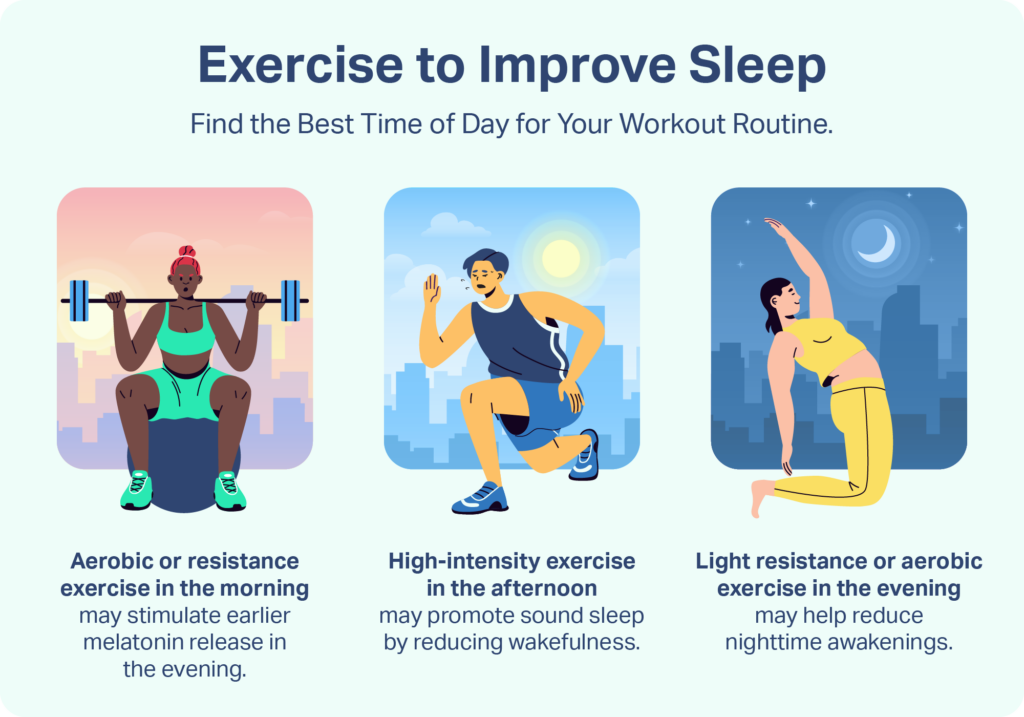Have you ever wondered if exercising before bed is a good idea? You might think a workout can help you sleep better, or maybe you worry it could keep you awake.
The truth isn’t always clear, and what works for one person might not work for another. You’ll discover how exercising before bed can affect your body and mind. By the end, you’ll know exactly what to do to improve your sleep and boost your energy.
Ready to find out if late-night workouts are right for you? Keep reading.
Exercise And Sleep Connection
Exercise and sleep share a strong connection that affects your health. Moving your body can change how well you rest at night. Understanding this link helps you decide if exercising before bed is right for you.
Sleep is vital for your body to heal and recharge. Exercise influences sleep quality and your ability to fall asleep. Let’s explore how exercise impacts sleep and the best timing for workouts.
How Exercise Affects Sleep Quality
Exercise can improve deep sleep, the most restful sleep stage. It helps reduce stress and anxiety, making it easier to relax. Physical activity raises your body temperature, then it drops, signaling your body to sleep.
Regular exercise also increases the time spent in slow-wave sleep. This stage restores muscles and boosts immune function. People who exercise often report better sleep quality and feel more refreshed.
Timing And Sleep Cycles
Exercise timing affects your sleep differently. Early workouts boost alertness during the day and promote restful sleep at night. Late-night exercise may raise your heart rate and body temperature, making sleep harder.
Your body needs time to cool down after exercise to prepare for sleep. Working out too close to bedtime can delay falling asleep. Try finishing exercise at least one hour before bed for better results.

Credit: cimahealth.com
Benefits Of Exercising Before Bed
Exercising before bed can bring several benefits to your body and mind. It helps you relax and feel calm after a busy day. Your muscles get a chance to heal and become more flexible. Also, it can make falling asleep easier and faster. These benefits make a night workout worth trying for many people.
Stress Relief And Relaxation
Exercise reduces stress by lowering tension in your body. Moving your muscles helps release chemicals that make you feel good. This natural mood boost calms your mind. A relaxed mind is easier to quiet down before sleep. Light or moderate exercise can be especially soothing at night.
Improved Sleep Onset
Physical activity raises your body temperature for a short time. Afterward, your temperature drops, signaling your body to prepare for sleep. This cooling down helps you fall asleep faster. Exercise also reduces restless thoughts and anxiety. These effects combined lead to quicker sleep onset.
Muscle Recovery And Flexibility
Night workouts help your muscles recover from daily activities. Gentle stretching or yoga improves muscle flexibility. Better flexibility lowers the risk of injury. Exercising before bed increases blood flow to your muscles. This aids in faster healing and less stiffness in the morning.
Potential Risks Of Late-night Workouts
Exercising late at night may seem like a good way to end the day. Still, it can bring some risks that affect your health. Understanding these risks helps you decide the best time to work out.
Sleep Disruption And Insomnia
Working out too close to bedtime can make it hard to fall asleep. Exercise raises your body temperature and energy. This can keep your mind alert when it should be winding down. Many people find they toss and turn after late workouts. Poor sleep lowers energy and focus the next day.
Increased Heart Rate And Alertness
Exercise makes your heart beat faster. This increase can last for an hour or more after activity. A high heart rate signals your body to stay awake. Feeling alert and awake can delay sleep time. Your brain stays active, making it tough to relax.
Impact On Hormone Levels
Late-night workouts change hormone patterns in your body. Exercise boosts adrenaline and cortisol, stress-related hormones. These hormones help you stay awake and alert. They can block melatonin, the hormone that helps sleep. Hormone imbalance may cause restless nights and tired mornings.
Best Types Of Evening Exercises
Choosing the right exercise before bed helps improve sleep and relax your body. Not all workouts suit evenings. Some exercises calm the mind. Others might make it hard to fall asleep. Knowing the best types of evening exercises can guide your routine.
These exercises prepare your body for rest. They reduce stress and muscle tension. The key is to keep the body active but calm.
Low-intensity Workouts
Low-intensity workouts are gentle and easy to do. Walking at a slow pace or light cycling helps. These activities increase blood flow without raising heart rate too much. They help you relax without feeling too tired or wired. Perfect for winding down after a busy day.
Stretching And Yoga
Stretching and yoga improve flexibility and calm the mind. Simple stretches release tight muscles. Yoga combines breathing and movement. It lowers stress and prepares your body for sleep. These exercises help reduce stiffness from the day. They create a peaceful mood before bedtime.
Avoiding High-intensity Training
High-intensity training raises heart rate and adrenaline. This can make falling asleep hard. Exercises like sprinting or heavy lifting are best earlier in the day. Intense workouts can keep your brain awake. Avoid them close to bedtime to protect your sleep quality.
Tips For Exercising Before Bed
Exercising before bed can help you stay fit without taking time from your day. It needs care to avoid disturbing your sleep. Follow these tips for better results and restful nights.
Optimal Workout Duration
Keep your workout short and sweet. Aim for 20 to 30 minutes. This helps your body relax afterward. Long workouts raise your heart rate too much. It can make falling asleep harder.
Creating A Calming Post-exercise Routine
After exercise, slow down with gentle stretches. Try deep breathing or meditation. These calm your mind and body. Avoid screens and bright lights right after. Soft lighting helps your brain prepare for sleep.
Listening To Your Body’s Signals
Notice how your body feels during and after exercise. Stop if you feel too tired or restless. Some people feel energized and find it hard to sleep. Others feel relaxed and ready for bed. Respect your own signals to find what works.

Credit: www.livescience.com
Individual Factors To Consider
Deciding whether to exercise before bed depends on many personal factors. Each person reacts differently to evening workouts. Some feel energized, while others find it hard to sleep. Understanding your body and habits helps make the best choice.
Age And Fitness Level
Age changes how your body handles exercise late at night. Younger people often recover faster and may sleep well after exercise. Older adults might feel restless or have trouble falling asleep. Fitness level also matters. Regular exercisers may tolerate late workouts better than beginners.
Personal Sleep Patterns
Some people are naturally night owls, others early birds. Your sleep pattern affects how exercise impacts your rest. If you sleep deeply and easily, late exercise may not disturb you. Light sleepers or those with irregular sleep may find it harder to relax after activity. Pay attention to how your body reacts.
Medical Conditions
Certain health issues influence how exercise affects sleep. Conditions like anxiety or insomnia can worsen with late exercise. Heart problems or asthma may require avoiding intense activity before bed. Always check with a doctor if you have health concerns. Safety comes first in any workout plan.

Credit: www.sleepfoundation.org
Frequently Asked Questions
Is Exercising Before Bed Good For Sleep Quality?
Exercising before bed can improve sleep for some people. Light to moderate workouts help relax the body. However, intense exercise may increase alertness, making sleep difficult. Listen to your body and choose workouts that promote calmness if done before bedtime.
How Long Before Bed Should I Exercise?
It’s best to finish exercise at least 1-2 hours before bedtime. This allows your heart rate and body temperature to return to normal. Exercising too close to sleep time may disrupt your ability to fall asleep quickly and reduce overall sleep quality.
What Types Of Exercises Are Best Before Bedtime?
Gentle exercises like yoga, stretching, or light walking are ideal before bed. These activities help relax muscles and calm the mind. Avoid high-intensity workouts late at night, as they can increase energy levels and interfere with falling asleep.
Can Nighttime Exercise Affect My Sleep Cycle?
Nighttime exercise can impact your sleep cycle depending on intensity. Moderate exercise may improve sleep phases, while vigorous workouts can delay sleep onset. Pay attention to how your body reacts and adjust your routine for better rest.
Conclusion
Exercising before bed can help some people relax and sleep better. Others might feel too awake and find it hard to rest. It depends on your body and routine. Try different times to see what suits you best. Keep workouts light and avoid heavy exercise late at night.
Good sleep matters for health and energy. Find a balance that helps you feel calm and ready for bed. Your body will thank you.
